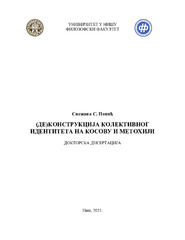Приказ основних података о дисертацији
(De)konstrukcija kolektivnog identiteta na Kosovu i Metohiji
| dc.contributor.advisor | Petrović, Jasmina | |
| dc.contributor.other | Gavrilović, Danijela | |
| dc.contributor.other | Šutović, Milojica | |
| dc.contributor.other | Petković, Jelena | |
| dc.creator | Popić, Snežana S. | |
| dc.date.accessioned | 2023-11-18T10:54:11Z | |
| dc.date.available | 2023-11-18T10:54:11Z | |
| dc.date.issued | 2021 | |
| dc.identifier.uri | http://eteze.ni.ac.rs/application/showtheses?thesesId=8517 | |
| dc.identifier.uri | https://fedorani.ni.ac.rs/fedora/get/o:1785/bdef:Content/download | |
| dc.identifier.uri | https://plus.cobiss.net/cobiss/sr/sr/bib/55379465 | |
| dc.identifier.uri | https://nardus.mpn.gov.rs/handle/123456789/21879 | |
| dc.description.abstract | The area of Kosovo and Metohija, an important symbolic space for national self-determination of the Serbian and Albanian communities, is currently under the process of deconstruction of political, social, and cultural elements structuring its social reality. Whether the discussion is about fictional traditions or the deconstruction of collective memory, or strengthening broader symbolic universes, their meaning is recognised in solidification and legitimising collectivities and collective identities. Contemporary structures of collective identities in this area imply deconstruction of the form of collective identities of Serbs and Albanians due to a deconstructed (post-conflict) social reality. The primary goal of this research is to lay out deconstructed elements and forms of collective identification of Serbs and Albanians in a post-conflict context. Having in mind the dialectical relations of the self, collectivity and social reality, the research examines the change in the structure of collective identities – especially in the identification forms of ethnic-national collectives and the categories which include members of war-ridden communities at Kosovo in Metohija, followed by the evaluation of the relationship towards the Other and the institutional reality of the Other. Starting from the theory of social constructionism, this research is of an exploitative character. It is a case study based on the analysis of secondary data on the social context, followed by applying the method of observation and the method of surveying in the acquisition of relevant experiential evidence on collective identity (de)construction. The research sample includes student populations of a Serbian and an Albanian state university from the territory of Kosovo and Metohija, grouped in the strata of students of both Serbian and Albanian ethnicity living in that area. The experiential data collection was carried out in 2020 through an online questionnaire based on appropriate modified and original tools. The observation and recording of the frequency of the use of the national flag were implemented in the same year on the territory of Kosovo and Metohija. The research results indicate a predominantly high expression of the collective identity, especially among the Serbian student population. At the same time, the genealogical-ethnic dimension is the most pronounced one in both Serbian and Albanian student populations. Respondents are characterised by prominent ethnic identity, as well as the mutual maintenance of ethnic distance. Although respondents show a moderate level of ethnocultural empathy, Serbian-Albanian communication can be found among those social spheres where a sophisticated model of intercultural skills is not required. The research findings indicate the justification for accepting the current assumption of this research, as the reaction of some to broader and less broad institutional changes is “cultural liberation” striving towards deconstructed forms of national identity (both original and novel ones). In contrast, others are involved in the general process of recategorisation; still, as far as norms are concerned, they remain at the “cultural defence” position and primarily adhere to original forms of national identification. | en |
| dc.format | application/pdf | |
| dc.language | sr | |
| dc.publisher | Универзитет у Нишу, Филозофски факултет | sr |
| dc.rights | openAccess | en |
| dc.rights.uri | https://creativecommons.org/licenses/by-nc-nd/4.0/ | |
| dc.source | Универзитет у Нишу | sr |
| dc.subject | socijalni konstrukcionizam, društvena stvarnost, kolektivni identitet, forme etno-nacionalnih identifikacija, interkulturna komunikacija, Kosovo i Metohija, studija slučaja | sr |
| dc.subject | social constructionism, social reality, collective identity, forms of ethnic-national identifications, intercultural communication, Kosovo and Metohija, case study | en |
| dc.title | (De)konstrukcija kolektivnog identiteta na Kosovu i Metohiji | sr |
| dc.type | doctoralThesis | |
| dc.rights.license | BY-NC-ND | |
| dc.identifier.fulltext | http://nardus.mpn.gov.rs/bitstream/id/156459/Doctoral_thesis_14395.pdf | |
| dc.identifier.fulltext | http://nardus.mpn.gov.rs/bitstream/id/156460/Popic_Snezana_S.pdf | |
| dc.identifier.rcub | https://hdl.handle.net/21.15107/rcub_nardus_21879 |



